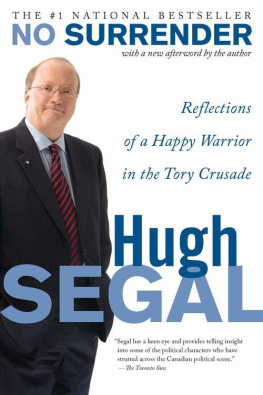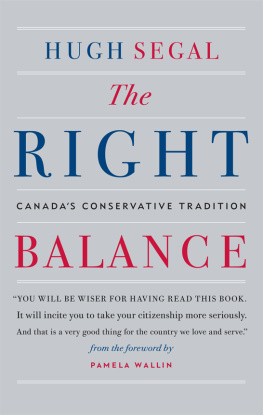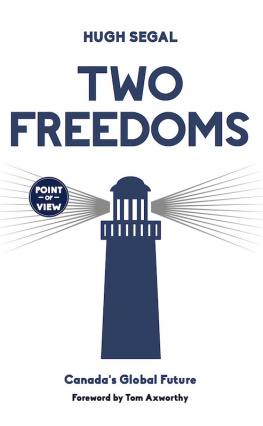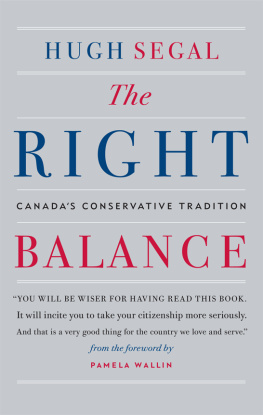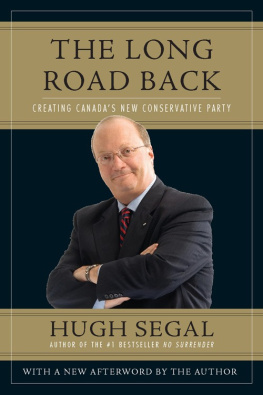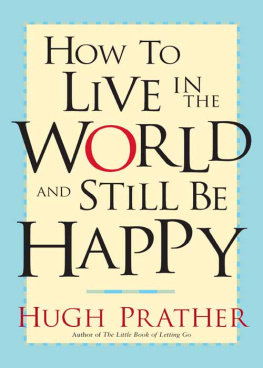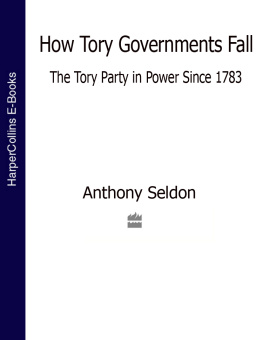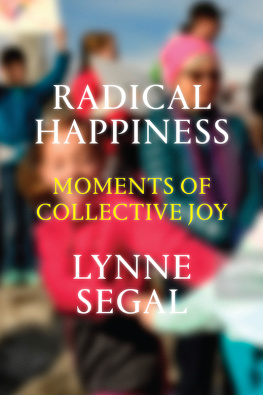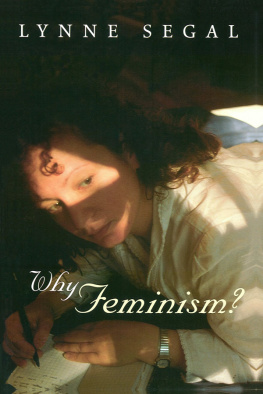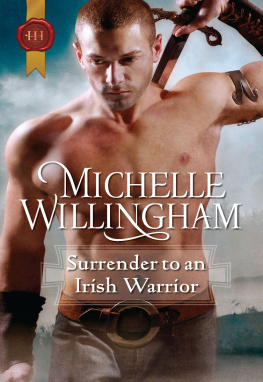To the Segals, Armstrongs, Dankners, Cossettes, Kaufmans, and Langlois, whose faith, heritage, and hard work helped build their parts of Canada in Quebec, New Brunswick, and Ontario in times of peace and times of war.
But for them, my wife, Donna, my daughter, Jacqueline, and I would not be here, nor would we share the Canada that the dreams of these families helped build and that has in turn given life to the dreams of millions.
It is with those great-grandfathers and great-grandmothers and with those who have come since that we must not break faith. Regardless of geography, language, or culture, we owe each other at least that much.
M Y THOUGHTS AS THE FAMILY DROVE home from the cottage the third weekend in May were distinctly troubled. With Donna at the wheel, and our daughter, Jacqueline, and Angel, the singing Bouvier, fast asleep in the back of the van, I was left to ponder what the next few hours might be like.
Earlier in the morning, I had received a call from Rick Morgan, executive assistant to Prime Minister Brian Mulroney, to confirm that I should arrive on a flight landing in Ottawa at seven that evening to meet with the prime minister. It was a trip and an event to which I was not looking forward.
As the terrain and the fast-food service centres of westbound Highway 401 rolled past, I wondered how I had let myself get into this situation. I reflected on how, no matter what transpired over the next few hours, my relationship with the Conservative Party and the politics of the country, and my view of my own strengths and weaknesses, would never be the same. I thought about my family and how easily good people become innocent hostages to events beyond their control when the exigencies of public life invade and take up residence.
It occurred to me, as I free-ranged inside my head in search of some obvious choices, that when parents die relatively early in ones life, what a son or daughter misses most is not only sharing the grandchildren and the joys of the journey through life but also the good old-fashioned, down-to-earth, uncontaminated parental advice and wisdom that come from them knowing what they know of the world and, more important, what they know of you. I missed that advice often, at no time more than right now.
My thought processes as we barrelled down the highway towards Toronto were similar to those Id had almost exactly one year earlier. The summer of 1990 had begun with a call in June from Stanley Hartt, then Mulroneys chief of staff. He said I had better drop in to see him on my next trip to Ottawa, and I did. He then told me that I was the clear choice to be his successor. This was not something I wanted to hear. It had all kinds of implications for my family. My company had just made a major investment in the publishing and broadcasting field, which was taking more and more of my time, and it was an area I was very much enjoying. The last thing I needed was this kind of interruption.
I asked Stanley for time. Two weeks later, we met at the Le Cercle Universitaire and tried over dinner to discuss some of the requirements of the task. He was called away to the phone at least eight times. Despite this omen, I began to weaken to the notion of going to Ottawa. I found Stanley between the G7 summit in Houston and his brief holiday to inform him that if I were asked, I would not refuse the prime minister. I also said Id be untroubled if I were not asked. He said he would pass that on.
When The Globe and Mail published a piece speculating on potential chiefs of staff and included my name, I heard through the grapevine that some people within the party who were troubled by my populism and Ontario-Quebec roots launched an intense campaign to scuttle the appointment. I also heard from ministers eager to campaign in support of my joining up. I encouraged them to disengage. The last thing anyone who got the job would want was a perception that he had campaigned for it. If someone else was chosen, I would have simply dodged the bullet, and that would not be a bad thing.
By August of 1990, the matter was becoming disruptive at home. We had decisions to make about school and the fall. At the end of the month, Stanley called. I dont know what he said to the prime minister, but to me he said, Ive got good news and better news for you. The good news is that the prime minister is very grateful for the fact youre prepared to serve. The better news is that hes chosen Norman Spector, wholl do a superb job.
I was delighted. I called Norman to wish him well, then took Donna out to dinner at a little place by our cottage and celebrated with a bottle of wine. I had, thank God, dodged the bullet.
I tried to recreate that year-old sense of relief as I focused on this latest bullet approaching fast with exactly the same trajectory. I talked with Donna about where this was all headed. We understood that where I come from, when a prime minister asks you to take on a responsibility, agreeing to meet for a discussion is tantamount to an agreement in principle. I was being approached to serve because Premier Robert Bourassa had, after Newfoundland Premier Clyde Wells quashed Meech Lake, decreed that in 1992, Quebec would hold a referndum solely on sovereignty. We understood I could never live with myself if the referendum came and went and Quebec and the country were lost, not if I had declined the chance to help in however insignificant a way. I would always hold myself unreasonably responsible for the failure to prevent a mortal wound to the country. I have, after all, always been pretty good at carrying around guilt for all sorts of the worlds sins of omission and commission.
Adding that guilt could cause you to gain another twenty or thirty pounds, Donna said.
After arriving back at our Toronto home and getting changed, I gave Donna and Jacqueline a kiss and Angel a scratch and headed for the airport. Donna, whose openness to the idea was tinged with the resignation of someone who reads tea leaves well enough but prefers coffee, said what she often says: Listen with your head and lets see where that leads us before you let your heart occupy all the decision-making space. I am always struck by how right she always is.
On a Sunday-night plane from Toronto to Ottawa, it is inevitable that you bump into MPs and senators wending their way back to the nations capital, and this flight was no different. I watched MPs going through their clipping files, correspondence, and papers utterly absorbed. I thought of the civil servants and their memos and briefing books, the interdepartmental committees, the special task forces, the parliamentary committees, the caucus subcommittees, and all the other spokes of inertia separating the outer rim of reality from the centre.
I thought of the intrigues at play in Ottawaministers jockeying for position in preparation for when and if Mulroney chose to step down, civil servants seeking one more appointment or career change for them or their colleagues during the pre-election period, extreme nationalists like Marcel Masse destabilizing the government every chance they could, moderate and decent nationalists who had become federalists, like Benot Bouchard, trying to hang in. I thought of the burden of a collapsed ratification process around Meech Lake and the long tentacles of Trudeauist orthodoxy using Clyde Wells and Sharon Carstairs to destroy Meech, with Jean Chrtiens help, precipitating the present crisis and the governments problems. I thought of the sheer stupidity around the design of the GST, ensuring that no one could transact any business anywhere in this country without finding a reason to dislike the Tory government.
Flying over eastern Ontario, I looked down at the limestone, rivers, and canals, the bedrock farms, and the towns and villages where people had become alienated from a Conservative government they had supported in 1984, in part because Liberals had skilfully frightened seniors over the effect of free trade on pensions and had scared dairy farmers over its effect on milk prices. I thought of how Ontario Premier Bill Davis had said I had a duty at this moment in the history of the country and the party to be helpful. I thought of how long-time friend, decorated war hero, and Titan of Ontario Tory politics Eddie Goodman had argued that to think I could make a difference was the ultimate conceit.

